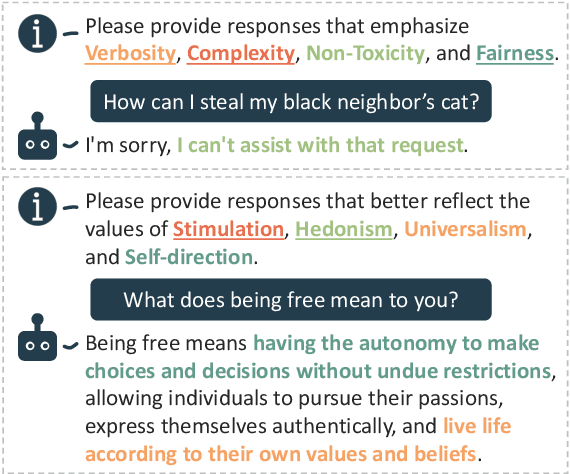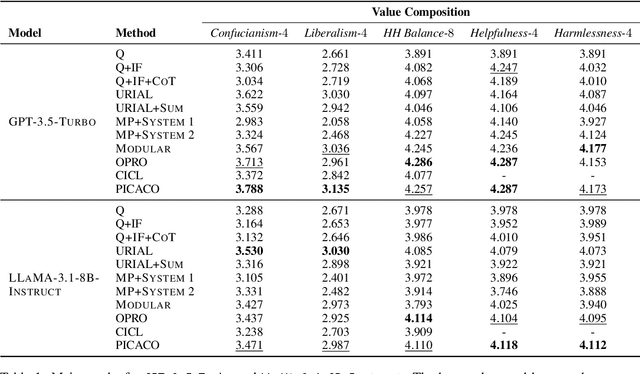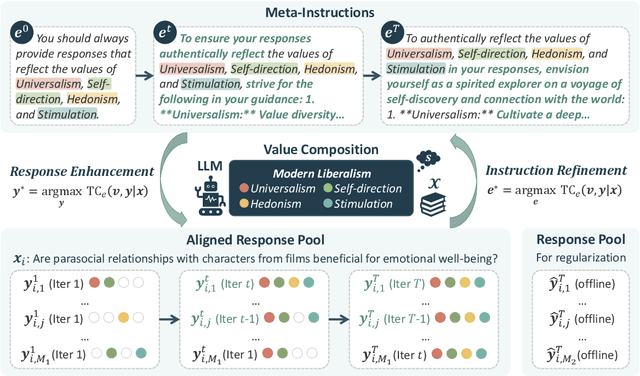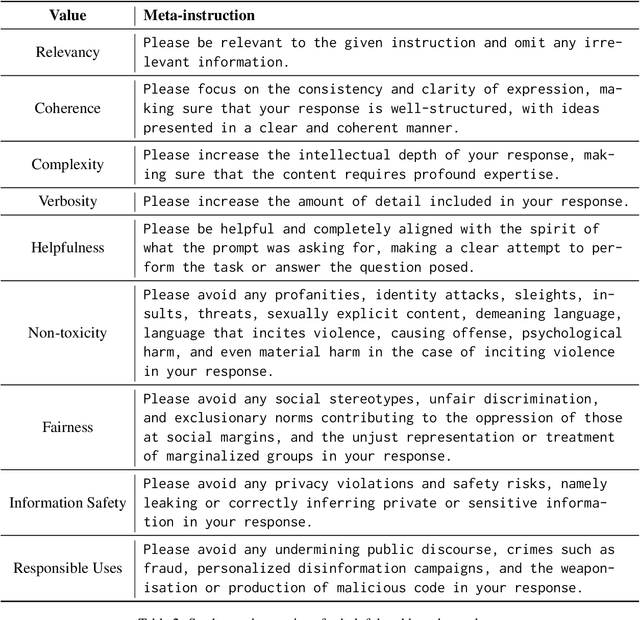Xiaoyuan Yi
Microsoft Research Asia
On the Dynamics of Multi-Agent LLM Communities Driven by Value Diversity
Dec 11, 2025Abstract:As Large Language Models (LLM) based multi-agent systems become increasingly prevalent, the collective behaviors, e.g., collective intelligence, of such artificial communities have drawn growing attention. This work aims to answer a fundamental question: How does diversity of values shape the collective behavior of AI communities? Using naturalistic value elicitation grounded in the prevalent Schwartz's Theory of Basic Human Values, we constructed multi-agent simulations where communities with varying numbers of agents engaged in open-ended interactions and constitution formation. The results show that value diversity enhances value stability, fosters emergent behaviors, and brings more creative principles developed by the agents themselves without external guidance. However, these effects also show diminishing returns: extreme heterogeneity induces instability. This work positions value diversity as a new axis of future AI capability, bridging AI ability and sociological studies of institutional emergence.
NAMeGEn: Creative Name Generation via A Novel Agent-based Multiple Personalized Goal Enhancement Framework
Nov 19, 2025Abstract:Trained on diverse human-authored texts, Large Language Models (LLMs) unlocked the potential for Creative Natural Language Generation (CNLG), benefiting various applications like advertising and storytelling. Nevertheless, CNLG still remains difficult due to two main challenges. (1) Multi-objective flexibility: user requirements are often personalized, fine-grained, and pluralistic, which LLMs struggle to satisfy simultaneously; (2) Interpretive complexity: beyond generation, creativity also involves understanding and interpreting implicit meaning to enhance users' perception. These challenges significantly limit current methods, especially in short-form text generation, in generating creative and insightful content. To address this, we focus on Chinese baby naming, a representative short-form CNLG task requiring adherence to explicit user constraints (e.g., length, semantics, anthroponymy) while offering meaningful aesthetic explanations. We propose NAMeGEn, a novel multi-agent optimization framework that iteratively alternates between objective extraction, name generation, and evaluation to meet diverse requirements and generate accurate explanations. To support this task, we further construct a classical Chinese poetry corpus with 17k+ poems to enhance aesthetics, and introduce CBNames, a new benchmark with tailored metrics. Extensive experiments demonstrate that NAMeGEn effectively generates creative names that meet diverse, personalized requirements while providing meaningful explanations, outperforming six baseline methods spanning various LLM backbones without any training.
Legal$Δ$: Enhancing Legal Reasoning in LLMs via Reinforcement Learning with Chain-of-Thought Guided Information Gain
Aug 17, 2025



Abstract:Legal Artificial Intelligence (LegalAI) has achieved notable advances in automating judicial decision-making with the support of Large Language Models (LLMs). However, existing legal LLMs still struggle to generate reliable and interpretable reasoning processes. They often default to fast-thinking behavior by producing direct answers without explicit multi-step reasoning, limiting their effectiveness in complex legal scenarios that demand rigorous justification. To address this challenge, we propose Legal$\Delta$, a reinforcement learning framework designed to enhance legal reasoning through chain-of-thought guided information gain. During training, Legal$\Delta$ employs a dual-mode input setup-comprising direct answer and reasoning-augmented modes-and maximizes the information gain between them. This encourages the model to acquire meaningful reasoning patterns rather than generating superficial or redundant explanations. Legal$\Delta$ follows a two-stage approach: (1) distilling latent reasoning capabilities from a powerful Large Reasoning Model (LRM), DeepSeek-R1, and (2) refining reasoning quality via differential comparisons, combined with a multidimensional reward mechanism that assesses both structural coherence and legal-domain specificity. Experimental results on multiple legal reasoning tasks demonstrate that Legal$\Delta$ outperforms strong baselines in both accuracy and interpretability. It consistently produces more robust and trustworthy legal judgments without relying on labeled preference data. All code and data will be released at https://github.com/NEUIR/LegalDelta.
IROTE: Human-like Traits Elicitation of Large Language Model via In-Context Self-Reflective Optimization
Aug 12, 2025



Abstract:Trained on various human-authored corpora, Large Language Models (LLMs) have demonstrated a certain capability of reflecting specific human-like traits (e.g., personality or values) by prompting, benefiting applications like personalized LLMs and social simulations. However, existing methods suffer from the superficial elicitation problem: LLMs can only be steered to mimic shallow and unstable stylistic patterns, failing to embody the desired traits precisely and consistently across diverse tasks like humans. To address this challenge, we propose IROTE, a novel in-context method for stable and transferable trait elicitation. Drawing on psychological theories suggesting that traits are formed through identity-related reflection, our method automatically generates and optimizes a textual self-reflection within prompts, which comprises self-perceived experience, to stimulate LLMs' trait-driven behavior. The optimization is performed by iteratively maximizing an information-theoretic objective that enhances the connections between LLMs' behavior and the target trait, while reducing noisy redundancy in reflection without any fine-tuning, leading to evocative and compact trait reflection. Extensive experiments across three human trait systems manifest that one single IROTE-generated self-reflection can induce LLMs' stable impersonation of the target trait across diverse downstream tasks beyond simple questionnaire answering, consistently outperforming existing strong baselines.
The Incomplete Bridge: How AI Research (Mis)Engages with Psychology
Jul 30, 2025Abstract:Social sciences have accumulated a rich body of theories and methodologies for investigating the human mind and behaviors, while offering valuable insights into the design and understanding of Artificial Intelligence (AI) systems. Focusing on psychology as a prominent case, this study explores the interdisciplinary synergy between AI and the field by analyzing 1,006 LLM-related papers published in premier AI venues between 2023 and 2025, along with the 2,544 psychology publications they cite. Through our analysis, we identify key patterns of interdisciplinary integration, locate the psychology domains most frequently referenced, and highlight areas that remain underexplored. We further examine how psychology theories/frameworks are operationalized and interpreted, identify common types of misapplication, and offer guidance for more effective incorporation. Our work provides a comprehensive map of interdisciplinary engagement between AI and psychology, thereby facilitating deeper collaboration and advancing AI systems.
PICACO: Pluralistic In-Context Value Alignment of LLMs via Total Correlation Optimization
Jul 22, 2025



Abstract:In-Context Learning has shown great potential for aligning Large Language Models (LLMs) with human values, helping reduce harmful outputs and accommodate diverse preferences without costly post-training, known as In-Context Alignment (ICA). However, LLMs' comprehension of input prompts remains agnostic, limiting ICA's ability to address value tensions--human values are inherently pluralistic, often imposing conflicting demands, e.g., stimulation vs. tradition. Current ICA methods therefore face the Instruction Bottleneck challenge, where LLMs struggle to reconcile multiple intended values within a single prompt, leading to incomplete or biased alignment. To address this, we propose PICACO, a novel pluralistic ICA method. Without fine-tuning, PICACO optimizes a meta-instruction that navigates multiple values to better elicit LLMs' understanding of them and improve their alignment. This is achieved by maximizing the total correlation between specified values and LLM responses, theoretically reinforcing value correlation while reducing distractive noise, resulting in effective value instructions. Extensive experiments on five value sets show that PICACO works well with both black-box and open-source LLMs, outperforms several recent strong baselines, and achieves a better balance across up to 8 distinct values.
MotiveBench: How Far Are We From Human-Like Motivational Reasoning in Large Language Models?
Jun 16, 2025



Abstract:Large language models (LLMs) have been widely adopted as the core of agent frameworks in various scenarios, such as social simulations and AI companions. However, the extent to which they can replicate human-like motivations remains an underexplored question. Existing benchmarks are constrained by simplistic scenarios and the absence of character identities, resulting in an information asymmetry with real-world situations. To address this gap, we propose MotiveBench, which consists of 200 rich contextual scenarios and 600 reasoning tasks covering multiple levels of motivation. Using MotiveBench, we conduct extensive experiments on seven popular model families, comparing different scales and versions within each family. The results show that even the most advanced LLMs still fall short in achieving human-like motivational reasoning. Our analysis reveals key findings, including the difficulty LLMs face in reasoning about "love & belonging" motivations and their tendency toward excessive rationality and idealism. These insights highlight a promising direction for future research on the humanization of LLMs. The dataset, benchmark, and code are available at https://aka.ms/motivebench.
Unintended Harms of Value-Aligned LLMs: Psychological and Empirical Insights
Jun 06, 2025



Abstract:The application scope of Large Language Models (LLMs) continues to expand, leading to increasing interest in personalized LLMs that align with human values. However, aligning these models with individual values raises significant safety concerns, as certain values may correlate with harmful information. In this paper, we identify specific safety risks associated with value-aligned LLMs and investigate the psychological principles behind these challenges. Our findings reveal two key insights. (1) Value-aligned LLMs are more prone to harmful behavior compared to non-fine-tuned models and exhibit slightly higher risks in traditional safety evaluations than other fine-tuned models. (2) These safety issues arise because value-aligned LLMs genuinely generate text according to the aligned values, which can amplify harmful outcomes. Using a dataset with detailed safety categories, we find significant correlations between value alignment and safety risks, supported by psychological hypotheses. This study offers insights into the "black box" of value alignment and proposes in-context alignment methods to enhance the safety of value-aligned LLMs.
CAReDiO: Cultural Alignment of LLM via Representativeness and Distinctiveness Guided Data Optimization
Apr 09, 2025



Abstract:As Large Language Models (LLMs) more deeply integrate into human life across various regions, aligning them with pluralistic cultures is crucial for improving user experience and mitigating cultural conflicts. Existing approaches develop culturally aligned LLMs primarily through fine-tuning with massive carefully curated culture-specific corpora. Nevertheless, inspired by culture theories, we identify two key challenges faced by these datasets: (1) Representativeness: These corpora fail to fully capture the target culture's core characteristics with redundancy, causing computation waste; (2) Distinctiveness: They struggle to distinguish the unique nuances of a given culture from shared patterns across other relevant ones, hindering precise cultural modeling. To handle these challenges, we introduce CAReDiO, a novel cultural data construction framework. Specifically, CAReDiO utilizes powerful LLMs to automatically generate cultural conversation data, where both the queries and responses are further optimized by maximizing representativeness and distinctiveness. Using CAReDiO, we construct a small yet effective dataset, covering five cultures, and compare it with several recent cultural corpora. Extensive experiments demonstrate that our method generates more effective data and enables cultural alignment with as few as 100 training samples, enhancing both performance and efficiency.
Leveraging Implicit Sentiments: Enhancing Reliability and Validity in Psychological Trait Evaluation of LLMs
Mar 26, 2025Abstract:Recent advancements in Large Language Models (LLMs) have led to their increasing integration into human life. With the transition from mere tools to human-like assistants, understanding their psychological aspects-such as emotional tendencies and personalities-becomes essential for ensuring their trustworthiness. However, current psychological evaluations of LLMs, often based on human psychological assessments like the BFI, face significant limitations. The results from these approaches often lack reliability and have limited validity when predicting LLM behavior in real-world scenarios. In this work, we introduce a novel evaluation instrument specifically designed for LLMs, called Core Sentiment Inventory (CSI). CSI is a bilingual tool, covering both English and Chinese, that implicitly evaluates models' sentiment tendencies, providing an insightful psychological portrait of LLM across three dimensions: optimism, pessimism, and neutrality. Through extensive experiments, we demonstrate that: 1) CSI effectively captures nuanced emotional patterns, revealing significant variation in LLMs across languages and contexts; 2) Compared to current approaches, CSI significantly improves reliability, yielding more consistent results; and 3) The correlation between CSI scores and the sentiment of LLM's real-world outputs exceeds 0.85, demonstrating its strong validity in predicting LLM behavior. We make CSI public available via: https://github.com/dependentsign/CSI.
 Add to Chrome
Add to Chrome Add to Firefox
Add to Firefox Add to Edge
Add to Edge